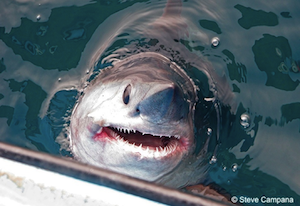|
Imperiled Ocean Carnivore Gets Second Chance for ESA Listing Washington, DC—Today, the gravely imperiled porbeagle shark (Lamna nasus) moved a step closer to needed legal safeguards when the National Marine Fisheries Service (Fisheries Service) found the species may warrant Endangered Species Act (ESA) protections. The new finding comes after the Fisheries Service’s previous negative determination on WildEarth Guardians’ petition to list the shark under the ESA was overturned by a federal judge. The finding will be published in tomorrow’s Federal Register. “Sharks are the ‘wolves of the sea;’ they shape ocean ecosystems much as wolves shape ecosystems on land,” said Taylor Jones, endangered species advocate for WildEarth Guardians. “Without protections, however, these key components of healthy ocean ecosystems will likely disappear, further impoverishing our oceans.” The Northwest Atlantic population of porbeagle sharks declined 90 percent since 1961 due to heavy fishing pressure. Shark meat is highly valued and they are also fished for their fins, hides, and livers. In September 2014, the parties to the Convention on International Trade in Endangered Species of Wild Fauna and Flora (CITES) listed porbeagle sharks under Appendix II, which puts increased restrictions on international trade in exploited species. Guardians submitted a legal petition to list porbeagle sharks in 2010, which the Fisheries Service rejected. Guardians challenged that decision in court and won. In November 2014, the court sent the decision back to the agency for reconsideration. Today’s positive finding triggers a more in-depth analysis of the threats to the sharks. Within twelve months, the Agency must determine whether to list the species as either threatened or endangered under the ESA. In December 2014, the agency closed the porbeagle shark fishery in the Northwest Atlantic indefinitely because quotas were already exceeded. “It is long past time that we recognize the severe threats to our oceans and employ the Endangered Species Act to protect our most imperiled marine wildlife,” said Jones “Porbeagle sharks deserve protections; too many top carnivores are under threat and we’ll keep fighting for them until they get the protections they need.” An estimated 50 to 80 percent of all life on earth is found in the oceans, but more than half of marine species may be at risk of extinction by 2100 without significant conservation efforts. In response to the current extinction crisis in our oceans, since 2010 Guardians submitted legal petitions for ESA listing for 28 shark species and subpopulations. Protection under the ESA is an effective safety net for imperiled species: more than 99 percent of plants and animals protected by the law exist today. The law is especially important as a defense against the current extinction crisis; species are disappearing at a rate much higher than the natural rate of extinction due to human activities. Scientists estimate that 227 species would have gone extinct if not for ESA protections. Recognizing the decline of ocean health, on July 22, 2010 President Obama issued an Executive Order requiring agencies, including NMFS, to “protect, maintain, and restore the health and biological diversity of ocean… ecosystems,” and to “use the best available science and knowledge to inform decisions affecting the ocean.” Yet the Fisheries Agency routinely misses deadlines for decisions on protecting marine species, and is very slow to protect species without prompting. To date the U.S. is largely failing to protect marine species under the ESA. Of the 2,226 species protected under the Act, only about 5 percent are marine species. Guardians’ petitions for ESA protections of imperiled marine species aims to begin righting this imbalance, which does not reflect the scientific reality of species at risk of extinction. ### The attached photo is available for press
use by permission of the photographer, with the stipulation that the watermark
remain on the photo. Contact tjones@wildearthguardians.org for a larger version of this image.
Porbeagle shark. Photo © Steve Campana |
|
|
info@wildearthguardians.org | © WildEarth Guardians | Historical Archives | Privacy Policy

